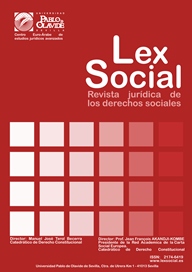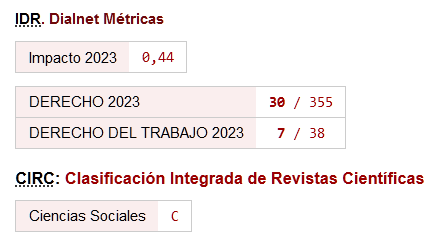Reconciliation at the crossroads: work and family life for domestic employers and employees
DOI:
https://doi.org/10.46661/lexsocial.4213Keywords:
reconciliation, domestic workers, domestic employers, transnationalityAbstract
Nowadays, reconciliation of family and working life constitutes an essential element of social analysis, as social transformations of the last decades have positioned this issue as a key part of the social structure. In Spain, as well as in other countries, domestic work has emerged as a solution to fulfil the needs of the native population. Consequently, a relegation of a deep reflection towards gender relations and social organization has taken place. The role of domestic workers as facilitators of everyday life questions the possibilities of these women to exercise their own work-life balance. This article, therefore, has the double aim of analysing the process of reconciliation acquired through domestic work as well as the strategies developed by the workers inside the sector.
Downloads
References
ACTIS, W. (2006).“La inserción en un mercado de trabajo fuertemente precarizado. Ecuatorianos en España (IV)”, La Insignia, www.lainsignia.org/2006/marzo/ibe_042.htm, último acceso abril 2019.
AD LOS MOLINOS (2017). La mujer inmigrante en el servicio doméstico. Análisis de la situación laboral e impacto de los cambios normativos, Madrid: Asociación Los Molinos.
ALBERDI, I. y P. ESCARIO (2007). Los hombres jóvenes y la paternidad, Bilbao: Fundación BBVA.
ARANGO, J.; DÍAZ GORFINKIEL, M. y MOUALHI, D. (2013). Promoting integration for migrant domestic workers in Spain, http://www.ilo.org/migrant/publications/working-papers/WCMS_222285/lang--en/index.htm, último acceso marzo 2019.
BUCECK, D. E. (1995). Care, gender and justice, Oxford: Clarendon Press.
CASTRO, C. (2018). “Aportaciones feministas al debate sobre la reorganización de los cuidados”, Viento Sur 156: 48-57, https://vientosur.info/spip.php?article13540, último acceso enero 2019.
DÍAZ GORFINKIEL, M. y MARTÍNEZ-BUJÁN, R. (2018). “Mujeres migrantes y trabajos de cuidados: transformaciones del sector doméstico en España”, Panorama Social, número 27: 23-36.
DÍAZ GORFINKIEL, M. (2011). “Migrant domestic work and changes in the ideas of childcare”, Journal of Comparative Family Studies – Volumen Especial ‘Family Diversity and Gender’, Vol. 42, No. 5.
FAIST, T. 2014. “On the transnational social question: How social inequalities are reproduced in Europe”. Journal of European Social Policy 24(3): 207–222.
FUENTES, V. Y AGRELA, B. (2015). “Violencia institucional hacia las inmigrantes bolivianas. Marianismo y restricción a la movilidad”, Athenea Digital, 15 (4): 81-104.
GREGORIO, C. (2017). “¿Por qué hablar de cuidados cuando hablamos de migraciones transnacionales?”, Quaderns-e 22 (2): 49-64.
HOCHSCHILD A. R. (2001). “Las cadenas mundiales de afecto y asistencia y la plusvalía emocional”, en El Límite: la vida en el capitalismo global, A. Giddens y W. Hutton, Coord, Madrid: Tusquets: 187-208.
HONDAGNEU-SOTELO P. y ÁVILA, E. (1997). “I’m here but I’m there: the meanings of Latina transnational motherhood”, Gender and society 11 (5): 548-71.
LEVITT, P., VITERNA, J., MUELLER, A. Y CHARLOTTE LLOYD (2017). “Transnational Social Protection: Setting the Agenda”, Oxford Development Studies 45(1): 2-19.
LEWIS, J. (2001). “The decline of the male breadwinner model: Implications for work and care”, Social Politics 8 (2): 152-169.
LUTZ, H. y PALENGA-MÖLLENBECK, E. (2012). “Care workers, care drain and care chains: reflections on care, migration and citizenship”, Social Politics 19 (1): 15-37.
MAQUIEIRA, V. et al (eds) (2001). Feminismos. Debates contemporáneos, Madrid: Alianza Editorial.
OSO, L. y CATARINO, C. (2000) “La inmigración femenina en Madrid y Lisboa: hacia una etnización del servicio doméstico y de las empresas de limpieza”, Papers 60: 183-207.
PARELLA, S. y SPERONI, T. (2018). “Las perspectivas transnacionales para el análisis de la protección social en contextos migratorios”, Autoctonía. Revista de Ciencias Sociales e Historia II (1): 37-56.
PARREÑAS, R. (2005). Children of globalization. Transnational families and gender woes, Stanford: Stanford University Press.
ROMERO, M. (1997). Feminism and families, H. Lindemann Nelson (coord.), Londres y Nueva York: Routledge.
SORENSEN, N., (2008). “La familia transnacional de latinoamericanos/as en Europa”, en G. Herrera, J. Ramírez (eds). América Latina migrante: Estado, familia, identidades, Quito: FLACSO: 259-280.
TOBÍO C. y DÍAZ GORFINKIEL, M. (2007). “The work-life balance. New gendered relationships in Spain: the ‘other’ in the care triangle”, International Journal of Iberian Studies 20 (1): 41-63.
TOBÍO, C. y FÉRNANDEZ CORDÓN, J.A. (2005). Conciliar las responsabilidades familiares y laborales: políticas y prácticas sociales, Madrid: Fundación Alternativas.
ZAGUIRRE, A. (2019). Empleadas de hogar: un caso evidente de discriminación indirecta, Madrid: Fundación Alternativas.
ZIMMERMAN, M. K., LITT, J. S. y BOSE, C. E (2005). Global dimensions of gender and carework, Stanford: Stanford University Press.
ZLOTNIK, H. (2003). “The global dimension of female migration”, Migration Policy Institute, Número especial Women & Migration, Migration Information Source, www.migrationinformation.com, ultimo acceso marzo 2019.
Downloads
Published
How to Cite
Issue
Section
License
Copyright (c) 2019 Lex Social: Revista de Derechos Sociales

This work is licensed under a Creative Commons Attribution-NonCommercial-NoDerivatives 4.0 International License.
-
Atribución — Usted debe dar crédito de manera adecuada, brindar un enlace a la licencia, e indicar si se han realizado cambios. Puede hacerlo en cualquier forma razonable, pero no de forma tal que sugiera que usted o su uso tienen el apoyo de la licenciante.
-
NoComercial — Usted no puede hacer uso del material con propósitos comerciales.
-
CompartirIgual — Si remezcla, transforma o crea a partir del material, deberá difundir sus contribuciones bajo la misma licencia que el original.



 @Lex Social
@Lex Social Linkedin
Linkedin @lexrevista.bsky.social
@lexrevista.bsky.social


